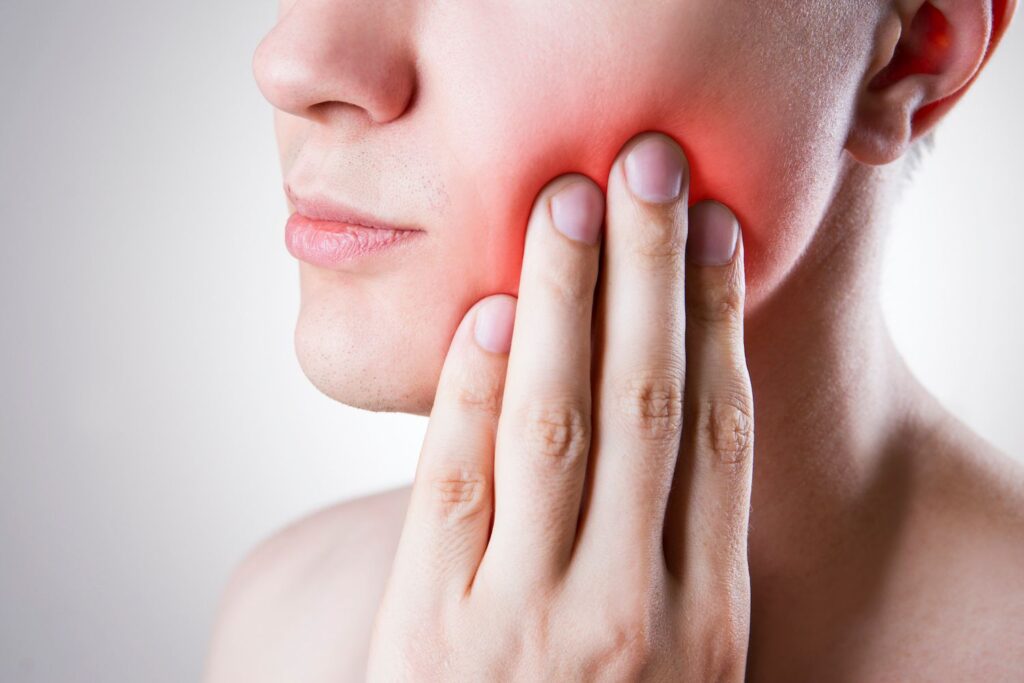Millions of people are affected by bruxism or teeth grinding. Patients with bruxism grind or clench their teeth on a chronic basis. Most people grind their teeth at night and, as a result, may not realize that they have a problem. Instead, they may notice headaches, sore jaws, or worn teeth.
What Is Bruxism?
Bruxism, the medical term for teeth grinding, is often the sign of an underlying bite problem. Although stress is also a primary cause of bruxism, when teeth are misaligned and the bite is out of balance, patients are more likely to grind or clench their teeth.
Dr. Brent Engelberg will take the time during an examination to look for the signs of bruxism and recommend the appropriate treatment to stop tooth grinding and repair tooth damage. Left untreated, bruxism can lead to tooth and gum damage as well as cause TMJ-related symptoms such as jaw pain and headaches.

Symptoms of Chronic Teeth Grinding
Grinding or clenching your teeth is often a subconscious behavior, so many dental patients do not notice they have this habit. It can also manifest during sleep when a patient is not aware of the action. However, chronic teeth grinding can come with noticeable symptoms that can help you identify this behavior in yourself. Common signs of bruxism include:
- Worn, cracked, or chipped teeth
- Dull or abraded tooth enamel
- Tooth sensitivity
- Broken dental fillings and/or crowns
- Headaches, especially in the morning
- Neck or shoulder pain
- TMJ disorders with symptoms like jaw soreness, stiffness, or dysfunction
- Insomnia.
Causes of Bruxism
The chronic grinding or clenching of teeth can develop for a number of reasons. However, the cause of your case of bruxism will play a major role in the treatment your dentist will suggest. Consider the following potential reasons you might have a teeth-grinding habit to better understand how to treat the issue:
- High stress levels or emotional distress
- Malocclusion or dental misalignment
- Temporomandibular joint disorders
- Sleep problems
- Certain chronic illnesses.
Risks of Untreated Bruxism
Constant pressure on your teeth from grinding and clenching will feel uncomfortable. But the behavior will heighten your risk of many dental problems if it continues unchecked. The following oral health problems might develop if you do not seek treatment for bruxism:
- Weakened enamel increases the danger of cavities and infections
- Strain on the gums heightens the risk of periodontal disease
- Excess pressure can damage existing dental work like fillings, crowns, and veneers
- Jaw strain can cause TMJ disorders and lead to a decline in oral function
- Dental injuries like chips, cracks, or fractures in the teeth
- Chronic pain in the teeth, jaw, face, neck, and shoulders.
Treatment Options for Teeth Grinding
Dr. Engelberg can recommend treatment for cases of chronic bruxism on a personalized basis for each patient. Your teeth-grinding treatment may vary depending on the cause and severity of your symptoms. Potential bruxism treatment options include:
- Stress relief or relaxation activities
- Targeted facial stretches and exercises
- Lifestyle changes
- Night guard
- Dental alignment solutions.
Bruxism FAQs
What can you do to stop grinding your teeth?
Stopping teeth grinding is done by identifying the source causing you to grind your teeth. This means finding what is causing you to grind your teeth and fixing that issue. For many people, it may be stress or anxiety causing them to grind their teeth. Addressing what area of one’s life is causing them stress will hopefully help stop the grinding. However, if an underlying dental problem is causing your bruxism, you should consult with your dentist to diagnose the issue and receive appropriate treatment.
Why is teeth grinding so harmful?
Teeth grinding harms your dental health because the action generates constant pressure upon your teeth. When extra force is applied to the teeth often, it can cause many issues with the enamel, the surface layer of the teeth. The enamel cannot heal itself, so you could leave your teeth vulnerable to further dental problems without intervention from your dentist and addressing the root problem of teeth grinding.
Does teeth grinding go away?
In the mildest cases, teeth grinding will resolve on its own. However, most people will need professional dental treatment to stop a teeth-grinding habit. Bruxism treatment begins with identifying the cause of this behavior. Consider lifestyle changes to address underlying stress and strain that can contribute to bruxism. Talk to your dentist to learn if oral health issues are making you grind and clench your teeth.
Why does teeth grinding cause headaches?
Bruxism makes your teeth grate against one another on a chronic basis, which puts abnormally high pressure on the teeth that extends to the surrounding muscles and joints. This can lead to strain that radiates to the jaw, head, neck, and elsewhere on the face. The resulting tension creates pain that contributes to headaches and other uncomfortable symptoms.
Does teeth grinding cause permanent damage?
If you do not address chronic bruxism, you could suffer severe consequences. Damaged and worn tooth enamel will not heal on its own, and you will need to seek dental attention to restore or replace lost enamel. You might also break a tooth, which will warrant urgent treatment from a dentist. Prevent permanent dental damage by treating underlying issues like teeth grinding promptly.
Find Relief from Teeth Grinding by Calling Dr. Engelberg
Discomfort from chronic bruxism can be resolved when you schedule a dental consultation with Dr. Engelberg at his Arlington Heights dental office. Reach AH Smiles by phone at (847) 230-9703 or contact the office online. Get rid of uncomfortable teeth-grinding symptoms and protect your smile with dental treatment.
